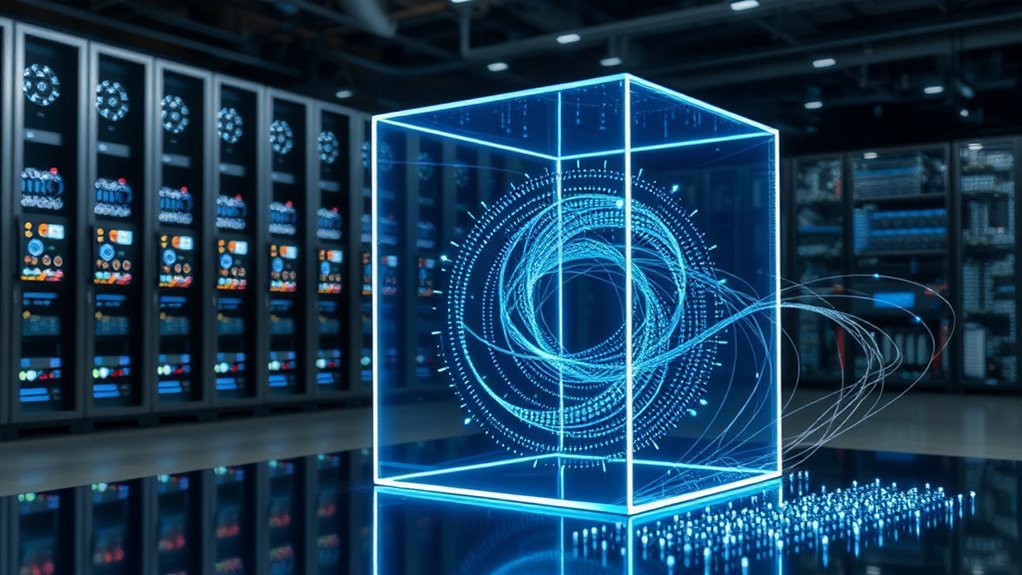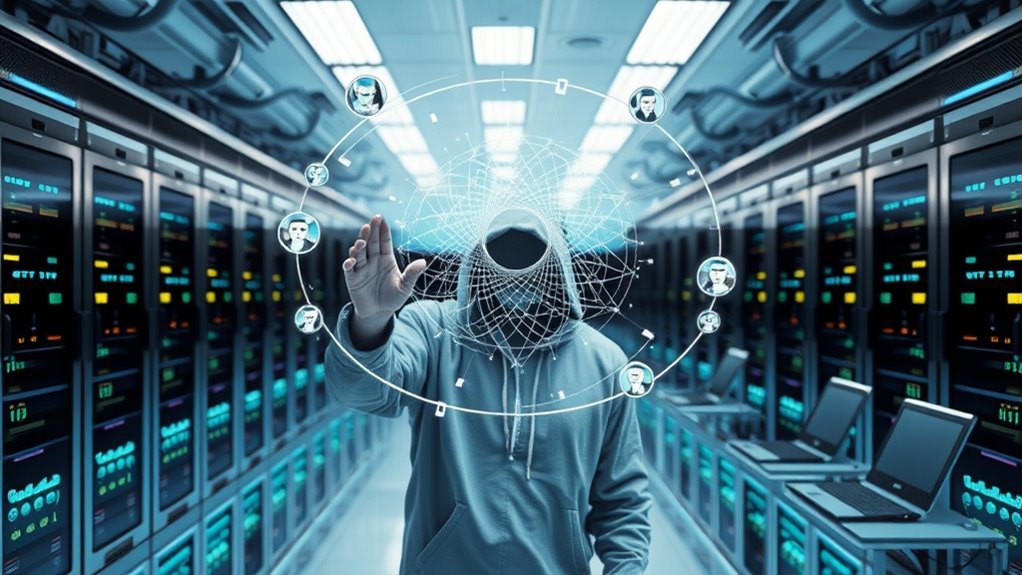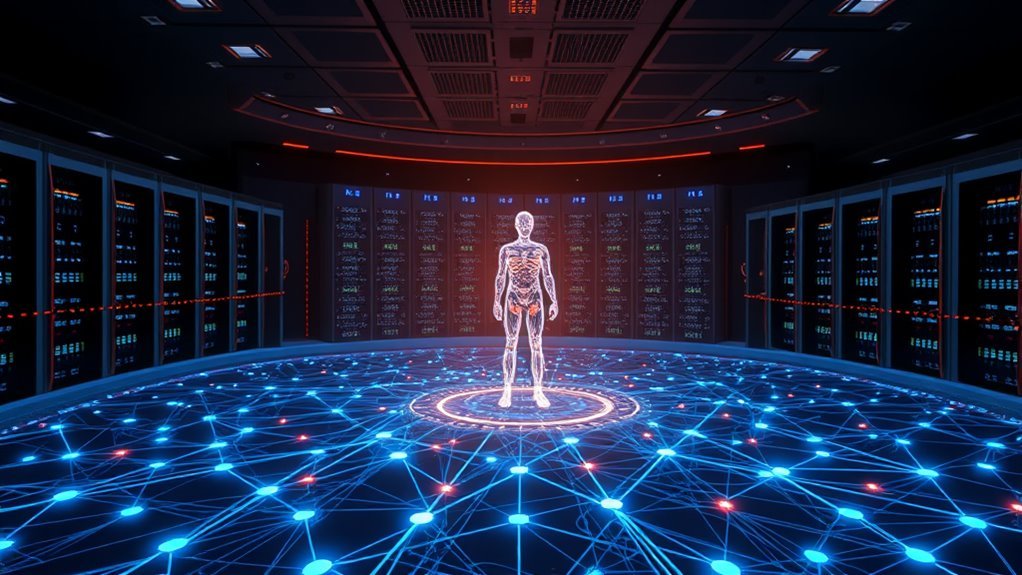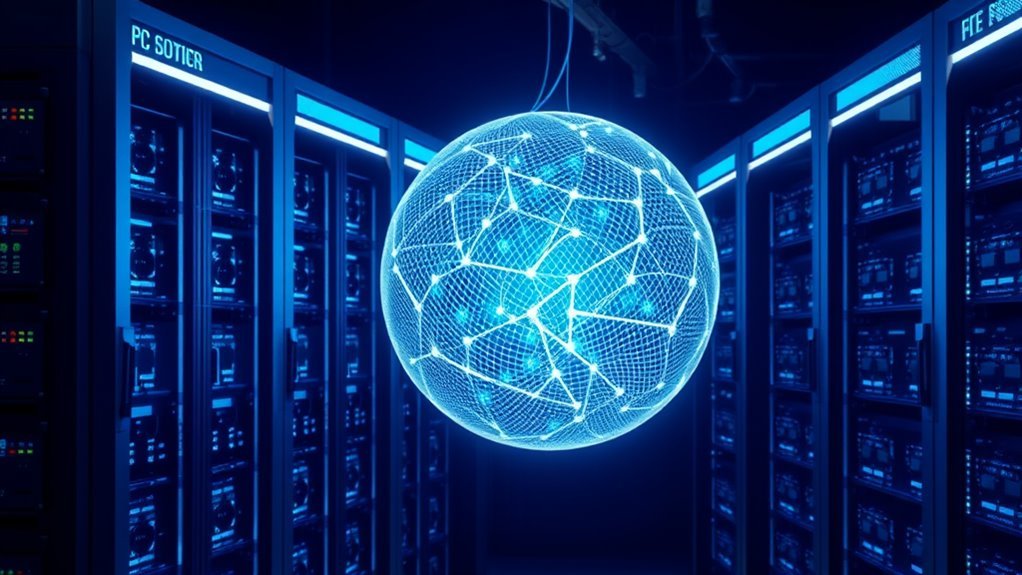You're about to enter a domain where blockchain-based AI agents are revolutionizing security protocol standards. These autonomous entities rely on secure communication protocols, like Access Control Conditions and Lit Actions, to guarantee authorized data access and confidential computations. Decentralized infrastructure and smart contracts facilitate trusted interactions, while robust encryption and threshold cryptography protect against unauthorized data exposure. As you investigate this new frontier, you'll uncover how AI agents are redefining operational efficiency and trading strategies in DeFi ecosystems, and how their capabilities are poised to transform the future of blockchain technology – and there's more to reveal in this exciting intersection of AI and blockchain.
Need-to-Knows
- Blockchain-based AI agents rely on secure communication protocols, such as Lit Protocol, to facilitate trusted interactions and data handling.
- Access Control Conditions (ACCs) and Threshold cryptography ensure authorized access and minimize single points of failure in key management.
- Confidential Compute Setups, like Trusted Execution Environments (TEEs), protect against unauthorized data exposure during processing.
- Programmable Key Pair (PKP) ensures secure user onboarding and data decryption, while Lit Actions (LAs) enable privacy-preserving computation.
- Robust encryption protocols and security audits are essential for mitigating vulnerabilities in smart contracts and ensuring the integrity of AI-driven blockchain networks.
Secure Agent Communication Protocols
Immerse yourself in the realm of secure agent communication protocols, where blockchain-based AI systems rely on inter-agent communication to process data across multiple AI agents while safeguarding privacy and integrity.
You'll find that these protocols utilize Access Control Conditions (ACCs) to define specific criteria for data decryption, guaranteeing only authorized agents can access sensitive information.
To facilitate secure data handling and computation, Confidential Compute Setups like Trusted Execution Environments (TEEs) are employed, protecting against unauthorized data exposure.
As you explore further, you'll see that communication between AI agents is fortified through threshold cryptography for key management, minimizing single points of failure and enhancing overall system security.
Additionally, AI agents utilize Lit Actions (LAs) for privacy-preserving computation, allowing them to perform signing, decryption, and calculations without compromising the confidentiality of the underlying data.
This allows real-time data processing while safeguarding against malicious actors.
Blockchain Networks for AI Agents
As you move beyond secure agent communication protocols, you'll find that blockchain networks provide a decentralized infrastructure that permits AI agents to operate autonomously, enhancing security and transparency in their transactions. This autonomy is made feasible by smart contracts, which automate decision-making processes and reduce the need for human intervention, minimizing potential errors.
The integration of AI agents with blockchain networks permits real-time data analysis, allowing for swift responses to market changes and optimizing trading strategies. You can trust that all actions taken by AI agents are verifiable and tamper-proof, thanks to blockchain's immutability.
Decentralized networks likewise facilitate the secure sharing of data among AI agents, utilizing robust encryption protocols to protect sensitive information during transactions. This setup guarantees that AI agents can operate securely and efficiently, making them ideal for applications that require rapid decision-making and precise execution.
Multi-Agent Systems and Communication

In a multi-agent system, your AI agents can specialize in distinct roles, such as planning, engineering, and critique, to improve task efficiency through collaboration. This setup allows you to utilize the strengths of each agent, guaranteeing that tasks are completed efficiently and effectively.
Effective inter-agent communication is essential in this setup, as it facilitates secure processing and coordination among the various AI agents within the blockchain environment.
The Orchestrator AI agent plays a significant role in managing the flow of information and tasks between specialized agents. By utilizing decentralized communication protocols, you can guarantee secure and trust-minimized interactions between agents, reducing the risk of data manipulation and enhancing system integrity.
This, in turn, leads to improved decision-making and operational efficiency, as agents share insights and data to optimize their individual and collective performance.
Lit Protocol for Enhanced Security
You can further improve the security of your blockchain-based AI agents by leveraging the Lit Protocol, a robust framework designed to facilitate trusted interactions and secure data handling within decentralized systems.
By employing a Programmable Key Pair (PKP), the Lit Protocol guarantees secure user onboarding and data decryption, facilitating trusted interactions. Access Control Conditions (ACCs) within the protocol define specific criteria for data decryption, augmenting security by assuring only authorized access to sensitive information.
The Lit Protocol's Confidential Compute Setup utilizes a Trusted Execution Environment (TEE) to maintain the integrity and security of sensitive data throughout processing.
Moreover, Lit Actions (LAs), which are immutable JavaScript programs, allow secure signing, decryption, and computations, providing a robust framework for data handling within AI-driven applications.
By permitting inter-agent communication, the Lit Protocol improves collaboration among AI agents while guaranteeing secure data handling, thereby prioritizing user privacy and data security.
This results in improved security for your blockchain-based AI agents, allowing them to operate with confidence in decentralized systems.
AI Agent Security Concerns and Solutions

Frequently, blockchain-based AI agents face a multitude of security concerns that can compromise their integrity and the data they handle. As you integrate AI agents into your blockchain ecosystem, you must be aware of the security risks involved.
Unauthorized access to your AI models can pose significant security risks, making robust key management and encryption practices vital to protect sensitive data. You must as well guarantee data privacy during AI training processes, complying with regulations like GDPR to handle user information ethically.
Implementing monitoring systems is imperative to detect suspicious blockchain activities and improve the security of your AI agents. When dealing with smart contracts, you must mitigate common vulnerabilities like reentrancy attacks and integer overflow through thorough security audits and best practices.
Finally, be cautious when interacting with external data, as cross-chain interactions can amplify potential attack vectors, necessitating stringent security measures.
Integrating Blockchain for AI Autonomy
Autonomous AI agents are poised to revolutionize industries with their ability to operate independently, making decisions, and taking actions without human intervention.
By integrating blockchain technology, you can create a decentralized foundation for these agents, enabling them to operate without centralized control while ensuring transparency and security in their actions. Smart contracts play an essential role in automating the execution of predefined actions by AI agents, allowing for seamless interactions with blockchain networks and enhancing operational efficiency.
Furthermore, the integration of AI agents with blockchain supports autonomous trading, portfolio management, and decision-making processes, leveraging real-time data to optimize performance and outcomes.
By utilizing blockchain's immutable ledger, AI agents can maintain a secure and verifiable history of their actions, promoting trust and accountability in decentralized ecosystems.
In addition, decentralized AI agents can utilize federated learning, training their models on local data while preserving privacy, enhancing the overall security and efficiency of AI applications within blockchain environments.
This synergy between AI and blockchain technology paves the way for secure, autonomous, and efficient AI applications.
Autonomous AI Agents in DeFi

As blockchain technology empowers AI agents with decentralized autonomy, their potential to transform industries grows increasingly apparent. You're about to release a new level of efficiency and responsiveness in DeFi applications. Autonomous AI agents can execute complex tasks like trading and asset management without human oversight, freeing you from tedious decision-making processes.
| Type of Automation | Operational Independence | Task Execution |
|---|---|---|
| Automatic Workflows | Limited | Pre-defined tasks |
| Agentic Workflows | Moderate | Dynamic task assignment |
| Fully Autonomous Agents | High | Self-determined decisions |
These AI agents utilize large language models and high-frequency data streams from both on-chain and off-chain sources to optimize trading positions and make informed financial decisions in real-time. By utilizing smart contracts, they autonomously manage transactions, mitigate risks, and optimize decision-making processes. The integration of AI agents in DeFi promotes a more user-centric financial environment, providing personalized trading strategies and governance models driven by data analysis and machine learning. You'll experience improved operational efficiency, responsiveness to market conditions, and improved decision-making capabilities.
Understanding AI Agent Capabilities
You'll often find that AI agents are capable of performing complex tasks with remarkable precision, leveraging their advanced analytical capabilities to reach well-considered outcomes in real-time.
As autonomous agents, they can operate independently within decentralized ecosystems, making knowledgeable choices based on real-time data from various data sources, including on-chain and off-chain streams. This allows them to stay responsive to current market dynamics, ensuring ideal actions are taken to balance potential profits, risks, and costs.
Their functionality is supported by optimization engines that calculate the most efficient courses of action, allowing for effective decision-making and resource allocation.
With the ability to analyze large amounts of data, AI agents can identify patterns and trends that may not be apparent to human analysts, making them invaluable in applications such as trading and asset management.
Mechanisms and Operation of AI Agents

Operating within the decentralized environment of blockchain networks, AI agents utilize smart contracts to execute predefined actions without human intervention, thereby enhancing efficiency and reliability in various tasks.
You'll find that these agents rely on high-frequency data streams from both on-chain and off-chain sources to guide their decision-making processes. Model inference applies learned knowledge to new data, generating predictions that are then integrated with model inferences to create actionable strategies.
As you explore further, you'll see that AI agents utilize optimization engines to calculate ideal actions, balancing potential profits, risks, and costs for effective resource management.
Their autonomous operations include managing smart contract execution and handling multi-step transactions, supported by built-in error handling mechanisms to address potential transaction failures. This facilitates seamless decision-making and execution, even in complex scenarios.
With their ability to process vast amounts of data and reach informed conclusions, AI agents are revolutionizing the way blockchain networks operate.
Most-Asked Questions FAQ
How Can Blockchain and AI Be Used Together?
You can combine blockchain and AI to create autonomous agents that utilize smart contracts for data integrity, predictive analytics for supply chain optimization, and identity verification for privacy improvement, all within decentralized networks that guarantee transparency and security.
What's the Deal With the Convergence of AI and Blockchain?
You're wondering about the convergence of AI and blockchain? It's all about combining AI's machine learning prowess with blockchain's decentralized, trustless systems to guarantee AI ethics, while tackling blockchain scalability, data privacy, and smart contracts, ultimately securing digital assets and decentralized identity.
How Can AI Protect Us?
You can rest assured that AI protects you through advanced security measures, detecting cyber threats in real-time with predictive analytics, enhancing data privacy, preventing fraud, and automating responses, all while evaluating risks and managing vulnerabilities.
What Is Decentralizing AI Using Blockchain Technology for Secure Decision-Making?
You're decentralizing AI using blockchain tech to guarantee secure decision-making by enabling decentralized governance, secure data storage, and trustless interactions, while preserving privacy, using transparent algorithms, distributed computing, and consensus mechanisms that prioritize ethical considerations.
Conclusion
You've now grasped the concept of blockchain-based AI agents and their potential to revolutionize the way we approach security protocols. By integrating blockchain technology with AI autonomy, you can guarantee secure communication and decision-making processes within multi-agent systems. As you move forward, remember to prioritize AI agent security concerns and utilize Lit Protocol for improved security. The future of DeFi and autonomous AI agents depends on it.
